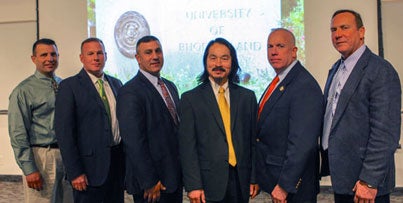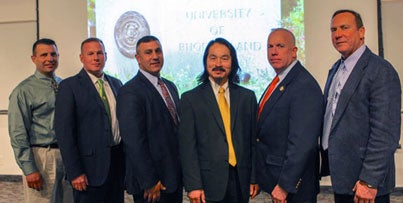KINGSTON, R.I. – January 29, 2015 – Eric Murray opened his presentation on leadership in law enforcement with a funny, but important story.
 The Connecticut State Police commander and founder and president of Team Training Associates told about 100 law enforcement personnel gathered last week on the University of Rhode Island Kingston Campus about a previous talk that he began with an upset stomach.
The Connecticut State Police commander and founder and president of Team Training Associates told about 100 law enforcement personnel gathered last week on the University of Rhode Island Kingston Campus about a previous talk that he began with an upset stomach.
“I don’t usually use a lapel microphone, but this group insisted,” said the decorated 30-year veteran of the Connecticut State Police with a booming voice. “So I began my talk as my stomach was turning and making some unhealthy sounds. When I couldn’t go on, I went to the bathroom (and became sick). When I cleaned myself up and returned to the lecture, those in attendance were chuckling and smiling. I then realized I had left the microphone on.
“So, the first lesson today is the microphone is always on, and it has never been more true than it is today for law enforcement when you consider the influence of smart phones, You Tube, social media and the Internet as a whole.”
Through a partnership with URI’s Police Department and Team Training Associates, Murray and other members of his team, Daniel Jewiss, an 18-year veteran of the Connecticut State Police and lead case officer in the Sandy Hook Elementary School shootings and Sang H. Kim, an exercise science and martial arts expert, discussed a variety of issues related to law enforcement leadership, the value of meditation, movement and relaxation and lessons learned from Sandy Hook.
“I am proud that the University of Rhode Island Police Department provided such an excellent training opportunity for law enforcement personnel from 15 different agencies around the state and our own department,” URI Public Safety Director Stephen Baker said. “The quality of the instructors was outstanding and the subject matter was relevant. I am sure everyone left the program thinking about ways to improve themselves and their organizations.”
“As soon as the Polishing the Badge leadership development training ended, I began receiving emails and texts with positive reviews,” URI Police Maj. Michael Jagoda said. “Attendees were visibly rejuvenated and eager to implement strategies they learned. This type of training should be ongoing and is critical to the success of URI’s Police Department.”
Murray told the group, which included other college police and security departments, municipal police officers and Rhode Island Department of Corrections officers, that many dread Mondays and begin the week with a bad attitude. That attitude can influence an entire week. When a supervisor is having a bad day, it can make everyone’s day worse, and that happens in all organizations, Murray said.
“My team and I are here today to help you deal with the spirit snipers,” Murray said.
Murray’s lesson number two was “attitude is everything.’
“Is it focused on others and how you have been wronged? When you blame others for your misfortune, you give them control.”
One of his answers to that problem was collaboration. “You see what others see when you learn to collaborate, to share and come to realize there is no one answer. Trust is one of the key elements of leadership, and conveying clear expectations through regular communication only improves trust.”
When Murray became commander of his state police troop, he met individually with all 67 troopers so he could learn about their aspirations, frustrations and their personal interests.
He said law enforcement is good at coming together during and after tragedies, but added that more attention must be paid to officers’ effectiveness, health and wellness during day-to-day operations.
Murray referenced New England Patriots’ head coach Bill Belichick’s “do your job” credo in setting up lesson number three. He said one of the key issues law enforcement and many other organizations face is job misery, which involves, irrelevance (lack of recognizing the nobility of the profession), anonymity (a lack of recognition in the organization), and immeasurement (lack of evaluation and feedback provided by leadership).
Murray then asked the audience to rate their organizations’ and their own effectiveness. In most cases the individuals ranked themselves higher than they did their organizations.
“If you ranked yourself an 8 (out of 10), where is the incentive to improve?” Murray said. “The next decision you make could damage your organization.”
His lesson number four was “create the optimal environment,” which requires leaders to build psychological capital through hope, efficacy, resiliency and optimism. Lesson number four was, “nurture the hero within,” and his final lesson was “Be tough, Be Smart, and Be Nice!”
The program wound up with a presentation by Connecticut State Police Master Sgt. Jewiss on “Lessons Learned from the Sandy Hook School Shooting,” during which 20 children and 6 adult staff members were fatally shot Dec. 14, 2012.
He focused his discussion on the scripts followed by law enforcement and other organizations. “What should our ideal script be? How do we prepare to expect the unexpected?” Jewiss asked.
In the Sandy Hook shootings, Jewiss said law enforcement responded within three-and-half minutes of the first call, but he said milliseconds count during an incident like that. He focused heavily on communications; especially communications between dispatchers and units on the scene and how changes in long-established scripts could save seconds and, in turn, save lives.
Regarding families of the victims, he said no one has a right and need to know more than the families, and that police scrapped the usual practice of interviewing witnesses as soon as possible after a crime was committed.
“These people had just gone through a major trauma, and so what do you gain? The shooter was already dead.”
When it came to official notifications, “the victims’ families were treated with utmost respect,” Jewiss said. “Our notification teams included a trooper/officer, clergy member and mental health worker.”
Accuracy is critical Jewiss said. “Notification with wrong names or confused relationships can leave scars on families, and the officer walks away feeling horrible.”
Finally, he talked about the health and wellness of police officers and other first responders during and after a mass casualty incident.
“No single system works for everyone, and remind everyone in the organization about their purpose repeatedly. Remember who they were and not just who they become (after an incident).”
Among the resources that should be brought in to assist law enforcement are: employee assistance programs; mental health providers; police chaplains and service dogs. The essentials of eating, sleeping and exercise must not be overlooked, Jewiss said.
“Remember, there is always a secondary attack, the one on the officers’ mental health.”
Jewiss closed with a video showing still images of first responders in action and consoling themselves and families at Sandy Hook, victims families’ and funerals of those killed during the attack.
The audience sat tearful and silent.
LEADERSHIP TEAM: Leaders of Team Training Associates and the University of Rhode Island Public Safety Department pose for a photo during a break in a training program at URI titled, “Polishing the Badge, Leading for Optimal Performance. From left to right are: James Gilman, master sergeant, Connecticut State Police; Daniel Jewiss, senior associate with Team Training and Connecticut State Police trooper; Michael Jagoda, URI Police major; Sang H. Kim, senior advisor with Team Training, exercise scientist and martial arts expert; Eric Murray, founder and president of Team Training and Connecticut State Police commander and Stephen Baker, director of URI’s Public Safety Department. URI photo by Shelbey Galliher.

